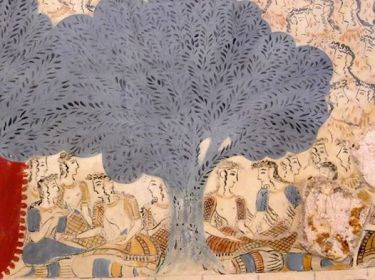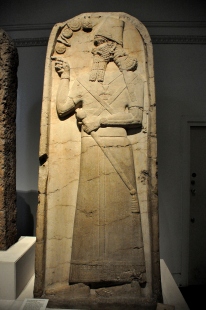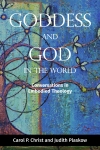 No matter how carefully developed they are, theories of female power in pre-patriarchal societies are dismissed in academic circles as “romantic fantasies” of a “golden age” based in “emotional longings” with “no basis in fact.” I was reminded of this while reviewing three books about the Goddess last week.
No matter how carefully developed they are, theories of female power in pre-patriarchal societies are dismissed in academic circles as “romantic fantasies” of a “golden age” based in “emotional longings” with “no basis in fact.” I was reminded of this while reviewing three books about the Goddess last week.
In one of the books, the co-authors, who define themselves as feminists, summarily dismiss theories about the origins of Goddess worship in pre-patriarchal prehistory. In another, the author traces the origin of certain Goddess stories and symbols found in recent folklore back to the beginnings of agriculture. Inexplicably, she stops there, not even mentioning the theory that women invented agriculture. Considering that possibility might have suggested that the symbols and stories the she was investigating were developed by women as part of rituals connected to the agricultural cycle. To ask these questions would have raised a further one: the question of female power in prehistory. And this it seems is a question that cannot be asked. This question was addressed in the third (very scholarly) book, which I fear will simply be ignored.

When I mentioned my unease with the first two books to a friend who is friends with a number of archaeologists, she commented, “Archaeologists won’t say anything that cannot be proved.” “Not so,” I responded, “archaeologists will say a lot of things that cannot be proved. What they won’t do is put forward theories that challenge the idea that our culture, the modern western culture which is based on ancient Greek culture, is the highest culture in the history of the world.” I believe that the work of Marija Gimbutas is being dismissed as nothing more than “romantic fantasy” because she dared to suggest that the religion and culture of Neolithic Old Europe might have been superior to those that came after it.
As I thought about these books, a discussion I had last summer with two male archaeologists kept creeping back into my mind. Beginning from our common assumption that the Goddess was the main deity in ancient Crete and that there was no evidence for war, I suggested to them that patriarchy and warfare arise together: the earliest kings are warrior kings. Thus, I continued, if Minoan Crete did not have war, it probably did not have kings.

I referred this conversation in a previous blog in which I presented rational arguments for the view that Crete was not ruled by a king. I outlined recent challenges to Arthur Evans’ reconstruction of the image of male rulership he named the Prince of the Lilies. I suggested that if kingship is not universal, then it must be symbolically articulated. In the absence of images of powerful kings, we should assume that kingship did not exist.
In the earlier blog, I did not mention the emotional nature of the discussion that ensued with my male colleagues. Before our discussion even got off the ground, one of the men interjected: “You shouldn’t blame men for warfare and all the evil associated with it. After all, there were women guards at the death camps in Nazi Germany.” Surprised that the conversation so quickly turned to the Holocaust, I responded that I did not blame men, but rather a social structure known as patriarchy for the evil of Nazi Germany, adding that women have always participated in patriarchy. The discussion continued on an emotional level, as the two men debated the point I had already conceded: that men are not intrinsically evil or responsible for all the evil in the world. We never returned to the question of kings in Crete.

This story suggests that “emotional issues” are easily evoked on the other side of the debate about female power in prehistory. In this case, the mere suggestion that Crete might not have been ruled by kings led to an emotional outburst based in fear—fear that discussion of alternatives to patriarchy is tantamount to blaming men for all of the evil in the world. I was unsettled by this turn in the conversation, but surprisingly, I managed to maintain my cool. I did not react emotionally. I kept trying to return the conversation to discussion of evidence. The discussion continued to revolve around the stated and unstated fear that men might in fact be evil or responsible for all of the evils in the world.
I have been thinking about this conversation off and on ever since. In retrospect, I am relieved that the emotional issues underlying the discussions of female power in prehistory were so clearly exposed. “Am I evil?” “Are men inherently evil?” These are the suppressed and repressed questions that were coming to the surface. I reiterate that no amount of assurance on my part that men are not inherently evil could stem these emotional responses.
There are indeed emotional issues, longings, and fantasies connected to the discussion of female power in prehistory. The emotion that is hampering scholarly discussion is not the longing for a golden age. The evidence for or against scholarship based in such longings can be discussed and debated. The emotion that is hampering the discussion is the fear that pre-patriarchal societies might have existed. Until this fear and the loathing associated are confronted, important questions–questions that may even be crucial to our survival as a species–will continue to be dismissed and ignored.
Carol P. Christ is author or editor of eight books in Women and Religion and is one of the Foremothers of the Women’s Spirituality Movement. She leads the Goddess Pilgrimage to Crete in Spring and Fall. Follow Carol on Twitter @CarolP.Christ, Facebook Goddess Pilgrimage, and Facebook Carol P. Christ. Photo of Carol by Andrea Sarris.
 A Serpentine Path: Mysteries of the Goddess
A Serpentine Path: Mysteries of the Goddess will be published by Far Press in the spring of 2016. A journey from despair to the joy of life.
will be published by Far Press in the spring of 2016. A journey from despair to the joy of life.
Goddess and God in the World: Conversations in Embodied Theology with Judith Plaskow will be published by Fortress Press in June 2016. Exploring the connections of theology and autobiography and alternatives to the transcendent, omnipotent male God.


Inquiring minds would like to know what these books were. I know there are feminists who make a point of dismissing the stigmatized feminist histories, which is almost a requirement lest they be jettisoned themselves, but i like to keep tabs on what they’re saying.
LikeLike
Yes and what really gets my goat is that they quote Cynthia Eller’s The Myth of Matriarchal Prehistory without even considering the eloquent scholarly critiques of it by for example Kristy Coleman. Or the defenses of Gimbutas against her critics by Charlene Sprenak, Joan Marler, and others.
LikeLike
Goddesses in Context on Mesopotamia, Dancing Goddesses on Europe, and Matriarchal Societies, review for Religon and Gender (Ghent University, Belgium). Having just been submitted, the review has not yet been scheduled for publication.
LikeLike
Carol, I’m a Near Eastern archaeologist, and my Ph.D, dissertation, “Legacy of Dilmun: The Roots of Ancient Maritime Trade in Eastern Coastal Arabia in the 4th/3rd Millennium B.C.” involves Mesopotamian prehistory and history. I looked up “Goddesses in Context,” and I’d love to read your review. Is it available? I’d like to know the authors’ premise. Is it that Goddesses were very prominent in early Sumerian culture and persisted down through time, morphing into many other Goddesses with different names, but who were essentially descendants of (and sometimes even synonymous with) these earlier deities? If so, that’s a very intriguing concept which makes a lot of sense.
I’m sorry to hear that the authors “summarily dismiss theories about the origins of Goddess worship in pre-patriarchal prehistory.” That’s disheartening and frustrating. I’m a strong advocate and defender of Marija Gimbutas’ work, and Joan Marler is a good friend of mine. I’ve given slide lectures on the archaeological evidence for Neolithic Goddess Cultures in Old Europe and the Near East, both in the U.S, and in Dubrovnik, Croatia and Budapest. Also, in 1997, I did a pilgrimage recreating the Eleusinian Mysteries in Crete, Santorini, and Greece with Deena Metzger.
Is the rest of the book worthwhile from a truly feminist perspective? It’s very expensive, but I could try to acquire it via inter-library loan. However, before I do, I’d like your considered assessment.
Have enjoyed reading your 3-part blog series on Patriarchy. I completely concur!
I’m on Facebook, and follow you there. I’ve posted a number of comments on your page.
Will look forward to your reply.
LikeLike
Constance, the book exhaustive and covers art as well as text, an important methodological move. For the expert in the subject, it is a very important resource. It should also be consulted by non-specialists who write about individual Goddesses in Mesopotamia.
LikeLike
Re: “Goddesses in Context”: Thanks much, Carol. Covering the art (Goddess imagery, which, of course, is our sole evidence database in prehistoric times) is definitely an important methodological move! I’m intrigued, and will order the book. Will also very much look forward to reading your review when it is published.
LikeLike
https://www.researchgate.net/publication/316564792_Thinking_about_Goddesses_A_Review_of_Three_Recent_Books
LikeLike
so interesting yet exasperating how there is so much in our subconscious that is wedded to maintaining the status quo narratives even in academic settings like those you travel in… why wouldn’t there at least be a measure of curiosity: maybe just maybe there are some gaps in our patriarchal Western narrative? did you see any opening of their minds happening at all? i see this same phenomenon in evangelical egalitarian settings where people will only go so far in questioning the patriarchal presuppositions (and language) held to be orthodox because they don’t want to lose their good standing in the evangelical club. i love reading your articles. thank you for your work in the world.
LikeLike
I had a similar experience in a Constructive Theology class when I suggested that religious use of the words “lord” and kingdom” is off-putting to women. What I find most maddening is the privilege that allows men to ignore (or outright deny) their emotionality without question. Also regarding your spot on remarks about archaeologists – same thing happens in evolutionary theory, i.e., psychology and biology. The conjecture from these disciplines, which always happens to reinforce conventional thinking about gender, is presented as fact. Maddening.
LikeLike
Another great article Carol. The denial of academics can be infuriating, but Dr. Gimbutas said it would take 30 years for her ideas to break through the current paradigm, so by my count we’re almost there!. Dominator regression is alive and well, but more and more people are realizing that our partnership past is the key to a sustainable future. For me, I had my “aha” moment, at the Heraklion museum in 1992, and yes it was a deeply emotional experience where I felt in my heart and soul and Greek bones the reality of what had been denied by so many for so long, simultaneously opening up my mind to how rational the truth actually was.
LikeLiked by 1 person
Very significant point. The same thing so often has happened to me when I address “re-mything” culture – almost immediately I become a “man hater” in the eyes of men, or at the very least, they trivialize it as “women’s issues”. Men and women identified with patriarchal thinking simply can’t imagine a different paradigm, even through there are many contemporary arisings that indicate other ways of being humans, in our diverse evolutions, might have found. I think of the fact that many non-profits are now, realistically, concentrating on empowering women in community, because it has been demonstrated that when the wealth is distributed to the women it tends to circulate, instead of leaving the village or being used to establish ‘alpha male” status.
LikeLike
A wonderful post for Martin Luther King day observed, remembering a culture where there were no kings necessary. The fear you describe in men (“but are you saying men are inherently evil by positing a culture with matriarchal structure and values?!”) is likely related to the fears that sometimes rear up when white people are confronted with the reality of systemic racism. It takes courage to face the iniquity of structures that we have inherited and caught up in. And courage to imagine that cultures that might have been–or could one day be–different. How to let go of blame of self and others (and fear of blame) and take responsibility?
LikeLike
If the collective consciousness of contemporary maleness would find incentive to do the reflective work…
Perhaps this is the motivator: standing in the position of the “other” long enough to register consciously how it feels.
LikeLike
That is the problem, there is no incentive to do the reflective work. In fact, there is a disincentive as to do so might put you at odds with your colleagues.
LikeLike
Oh, yes, I hear you. And in the process of continuing on, one day a connection will happen. Not breaking rank$$$, is just where maleness is at present. We may not live to see that shift across traditional genders in THIS lifetime. http://www.ciis.edu/academics/graduate-programs/womens-spirituality/phd-in-philosophy-and-religion-with-a-concentration-in-womens-spirituality
😉❤️😉❤️😉
LikeLike
Intellectual and academic inquiry sing to my heart. I so deeply appreciate your analyses and challenges to those who would sweep ideas under the carpet. Thank you for your work!
LikeLike
Thanks, Carol, for painting the picture of the underlying fear that accompanies discussions of female power so vividly. My experience of this fear has come more from the other side of the the aisle, while teaching Women’s Studies 101. My mostly female students had extremely emotional experiences — fear, anger, sadness, denial, i.e. grief — at learning that they have been duped into the conventional understandings of our culture about gender. Changing an opinion, when it touches a person’s self-definition, is a highly emotional affair, because it means changing yourself. And that involves mourning the former self, and most people don’t want to go through that — at least at first — even if the new self will be better. So often the known evil is preferred to the unknown.
LikeLike
Yes the women students react emotionally too, but on the other hand they have more of an incentive to change, as they have less to lose than the men.
LikeLike
I agree!
LikeLike
Thanks for covering this subject so clearly and refreshing my contact with Women’s Spirituality through your blog. Goddess tours to Crete with you are on my bucket list. While studying with you and others at CIIS I attended the Women’s Studies conference in Oakland and met a feminist scholar of religion. When I told her I was also a feminist scholar of religion in Women’ Spirituality she dismissively snorted that we had shoddy scholarship! Belly-punched, I responded that she must be a “reformist” scholar, while I was “revolutionary” and she angrily retorted she was a lesbian scholar of religion and that was plenty revolutionary. I meekly faded away.
LikeLike
Don’t fade away, or allow yourself to be intimidated. Being lesbian is not a get out jail free card for treating Women’s Spirituality with contempt. She has no right or basis to dismiss an entire field like that. Maybe she is an adherent of one of the dominant religions, which pretty much get a pass on their claims.
LikeLike
How can she dismiss a whole area of study? And along with it the woman who is standing before her and trying to make common cause? Me thinks the lady doth protest too much.
LikeLike
Intolerance and violence…. a looooooong ego-centered legacy.
LikeLike
Misogyny: The Male Malady by David Gilmore has some interesting things indeed to say about the “inherent evil” question regardng males.
LikeLike
So exasperating, yet fascinating, that there is this fear considering that men in power have been saying exactly the same thing about women for millennia – that we are responsible for all the evil in the world through Eve’s part in all humanity being tossed out of paradise. Taking the long perspective, the evidence collected by you, Marija Gimbutas, Max Dashu and so many others, is so overwhelming that I am sure that, in time, doubts about it will be a footnote to a history that affirms it all.
I recently read one of the books you cite and I was struck how it seemed like the author felt such a need to distance herself from theories of power in pre-patriarchal societies that she just stuck a paragraph about it in the introduction in what seemed to me to be a very gratuitous way, as if she had said “Well, I gotta put this in. Where will it be the least obvious that I’m feeling compelled to say it? Oh, I know! I’ll stick a paragraph right there!” Sigh.
LikeLike
Yes as you and Max both note, the disclaimer seems to be required if you want to hold onto your position and standing in the academy. And it does not matter that the works you cite have been criticized and challenged, just go on citing them and their word becomes law.
LikeLike
They have no problem with conjecture, flights of fancy, and ideas that could never be proven when spinning their theories of ancient warfare. It’s only when facts challenge the assumption of male dominance that the standard of proof becomes ridiculously high.
LikeLike
Great article. I’m gearing up to work on my dissertation in the Mythology program at Pacifica. This is all thoughtful material and I look forward to reading your review, Carol. Sounds very interesting. BTW, I looked online for the book you mention, Dancing Goddesses on Europe, but didn’t see it on Amazon. Is that the full title?
LikeLike
Dancing Goddesses – it is about European symbols.
LikeLike
Great and important essay, Carol. Are you familiar with the Ascent of Woman by Dr. Amanda Foreman that ran on the BBC in autumn? I was very impressed by her research into the role of women in ancient cultures.
http://www.ascentofwoman.com/
LikeLike
I have not seen the program. Is this a correct accessment?
“Foreman concludes that women are worshipped when agriculture is primitive; then, as it develops, men come to dominate. This assumes that women played no part in the development of agriculture, which considering they started from a position of being worshipped and presumably listened to, seems like a leap.”
LikeLike
People believe what they want to believe in spite of evidence to the contrary. Many scholars ignore data that does not fit their world view. Those who benefit, or believe they benefit, from patriarchy will distort data to fit and support the continuation of patriarchy. Those with a different view, usually but not always women, experience criticism and sometimes even ruined careers. Given that Judaism, Christianity, and Islam are all patriarchal religions, patriarchy will not be easy to overcome. However, the survival of Earth, and especially humans and higher order species, depends on a totally different world view where Nature is honored and valued and humans are not seen as separate and dominant over the whole.
LikeLike
Thinking about the male philosophers of the French Enlightenment, bringing back feminine oral wisdom, is is the current enlightenment conversation- led by women. Just keep going.
Implicit bias training will help in time, too. A long Western Civilization history rooted in violence can reunite with a glory that was once wise and not judgmental (not perfect, but not violent). Not like going backwards, just insistent about being remembered.
What is parallel phenomenon among disparate human groups, prior to technology?
I am not flippant, or whimsical in my responses… my chirps are sincere. One must simply, profoundly, deeply- continue.
This is good work; it is not for naught! The resistance is a sign of being on the right path.
😉❤️👍🏻
LikeLike
So glad I read this, because the men’s fear of being perceived as inherently bad explains so much. There is afterall, a lot to feel guilty about. Also, having appropriated the creative power of giving birth for themselves, which is an idea rather than a physical self, and thus suspect to the sensate perceptions that underlie so many assumptions, there must be a feeling of falseness and an accompanying fear of being called out. Our human brains are wired to deny, deflect, obfuscate and change reality so the more abstractly we live, the more ungrounded and uneasy we feel in in the more honest substrates of ourselves. Women leading, on the whole, less-privileged lives develop a closer relationship with what is. It makes it easier for some of us to look at all this. The denial seems insurmountable at time and it’s always disheartening, particularly when the defensiveness incites aggression. It helps to understand it as fear of rejection.
LikeLike